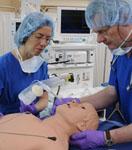
Medical Education Technologies (METI) offers its Human Patient Simulators for medical education programs, allowing learners to develop a high level of confidence and, ultimately, a demonstration of competence.
The company has training modules to meet many educational objectives. Each Learning Module is a turnkey educational package designed to provide meaningful learning experiences with real-time applications.
The Advanced Cardiac Life Support (ACLS) module is designed for facilitating learning of the American Heart Association (AHA) algorithms related to emergency cardiac care. Based on the 2006 AHA Guidelines, the ACLS Learning Module includes an ACLS Critical Actions Checklist for use in evaluating team performance. The simulations include: acute coronary syndrome, acute ischemic CVA, asystole, atrial fibrillation/junctional tachycardia, bradycardia and heart blocks, pulseless electrical activity, respiratory arrest, supraventricular tachycardia/ventricular tachycardia, ventricular fibrillation and tachycardia, and ventricular fibrillation/AED use.
The Pediatric Advanced Life Support (PALS) learning module is designed for facilitating learning of the AHA algorithms related to emergency care of the pediatric patient. It is based on the 2006 AHA Guidelines. It includes bradycardia, pulseless electrical activity, supraventricular tachycardia/ventricular tachycardia, and ventricular fibrillation.
The Perioperative Management learning module consists of 10 surgical patient care scenarios, which allow learners to incorporate many of the American College of Graduate Medical Education (ACGME) core competencies required in healthcare provider training during the course of patient assessment, diagnostic evaluation and management. These include: tachyarrhythmia management/atrial fibrillation, bradyarrhythmia management/bradycardia, and myocardial infarction.
For more information: www.meti.com


 November 14, 2025
November 14, 2025 









